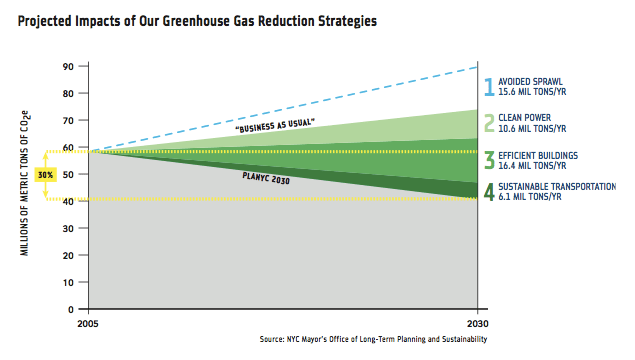
The Bloomberg administration released its annual greenhouse gas inventory last week [PDF], presenting some great environmental news: The city's annual greenhouse gas emissions decreased by 12.9 percent between 2005 and 2009. But inside the report is a worrisome statistic for sustainable transportation advocates. Barely any of that decrease is attributable to a greener transportation system. In fact, greenhouse gas emissions from private cars actually increased by 1.86 percent over those four years.
The persistence of NYC transportation emissions again calls to mind the state legislature's failure to pass the centerpiece of PlaNYC's transportation component -- congestion pricing. It's also a reminder of the major citywide reforms that the administration could still enact, like putting a stop to the proliferation of off-street parking.
In total, the inventory shows New York City reducing its carbon emissions from 56.6 million metric tons of carbon dioxide equivalent to 49.3 million. Only a small fraction of that reduction came from transportation, however: 359,000 metric tons. The bulk of that change came from improvements in the transit system: huge reductions were posted in emissions from diesel buses and in the amount of electricity used by the subways and commuter rail. There have also been large reductions in the emissions generated by transporting solid waste, due to a shift from trucking to rail.
In fact, the amount of carbon emissions from passenger cars, which account for around two-thirds of total transportation emissions in the city, actually increased between 2005 and 2009. Car emissions declined slightly from 2005 to 2007, but then rose from 2007 to 2009. Mayoral spokesman Jason Post explained that car emissions have risen because of an increase in total driving.
For PlaNYC's emissions goals to be a success, Post said, transportation emissions are going to have to decline. PlaNYC called for reducing transportation emissions by 6.1 million metric tons of carbon dioxide equivalent a year. Post argued, however, that the city is on track to meet all its PlaNYC goals, though he didn't specify how policies would push those transportation emissions down. PlaNYC has no intermediate benchmarks for transportation emissions between 2005 and 2030.
Congestion pricing was always meant to be PlaNYC's big-ticket transportation program. In London, congestion charging has reduced CO2 emissions inside the charge zone by about 20 percent [PDF]. For PlaNYC to get back on track in terms of reducing transportation's climate impact, we're going to need a policy of similar, or larger, scale.
New PlaNYC chief David Bragdon started work last month. Based on this inventory, looks like greening our transportation system and reducing driving has to be near the top of his agenda. Is it still a priority for the top-level Bloomberg officials above him?





